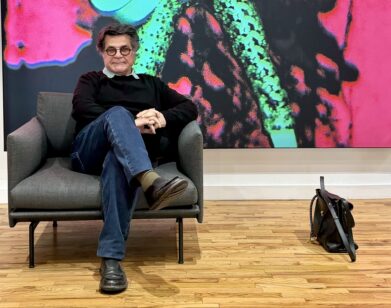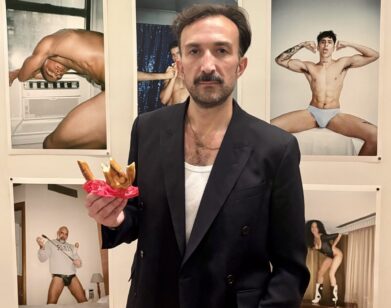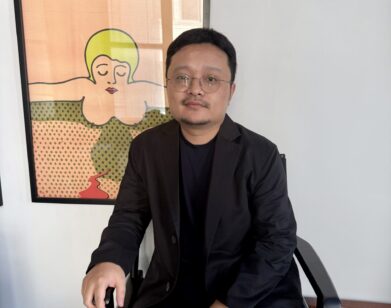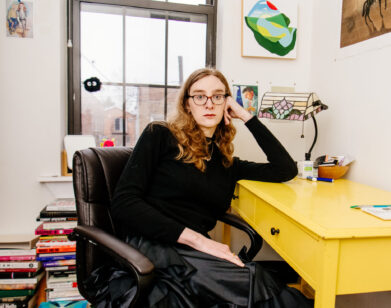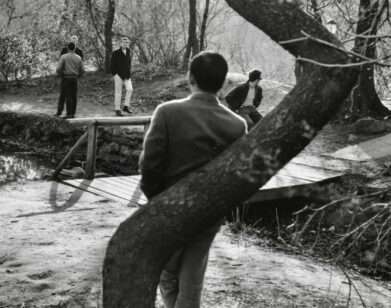Ian Edelman’s American Dream
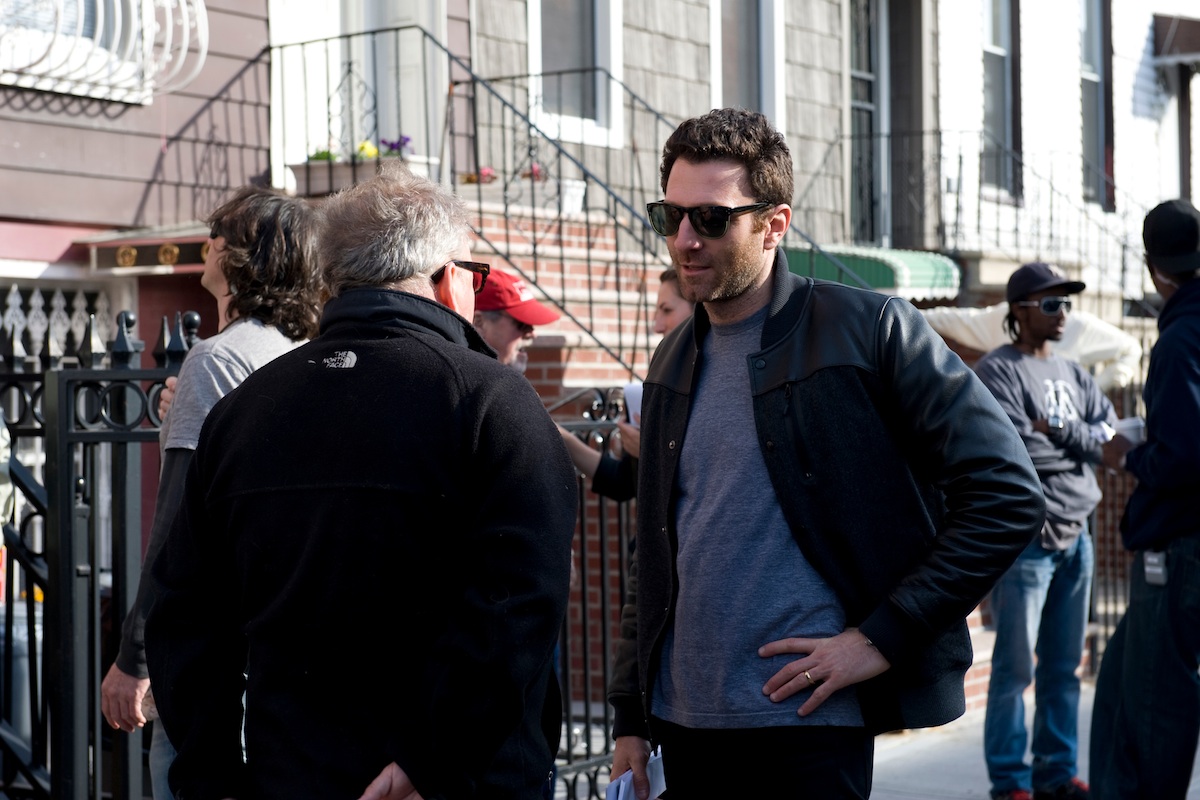
IAN EDELMAN. PHOTO COURTESY OF HBO
When How to Make It In America premiered last year on HBO, it was widely billed as an East Coast Entourage—and the show, which follows fledgling clothing designers Ben Epstein (Bryan Greenberg) and Cam Calderon (Victor Rasuk), as they attempt to launch their denim line, Crisp, into a national brand, does share some struggling-upwards themes with its West Coast counterpart. After the eight episodes of the show’s first season, though, the differences were clear: where Entourage is an in-your-face embodiment of California masculinity, How to Make it in America is quieter, more introspective—and quintessentially New York. With subtle, often very funny turns from Lake Bell as Rachel, Ben’s ex-girlfriend, Luis Guzmán as Cam’s shady cousin, and Kid Cudi and Shannyn Sossamon as friends of the designers, the show captures the highs, lows, and ennui of young Lower East Side creative types in an entirely new way.
On the occasion of the release of a new teaser trailer [below] for the show’s second season, which premieres October 2 on HBO, we caught up with How to Make it in America creator Ian Edelman to discuss Cam and Ben’s futures and his own American dream.
ALEXANDRIA SYMONDS: I’ve read a lot about the show, but I haven’t ever heard its origin story. Could you tell me how the project came about for you, originally?
IAN EDELMAN: It was sort of a two-pronged thing for me creatively, you know, growing up in New York City. My parents are first-generation Americans. Their parents are from Eastern Europe; they grew up in Brooklyn. When we would take car trips, they’d always tell me and my brother these sort of romanticized rags-to-riches stories. Ralph Lauren was such a big one for them—he’s from the Bronx, he worked for Bloomingdales, he had an idea, and took this incredible journey. Those success narratives were always something I was drawn to. I found the same magic quality in the story of Jay-Z—you know, he was a rapper and drug dealer and couldn’t get it going. And then he made a record label independently, and then became the greatest rapper in the world.
SYMONDS: Right.
EDELMAN: So it was all those stories, and then where I was at in my own life. When you’re in your mid-twenties, it’s a weird “Who will I become?” point in your life, the decisions you make at that stage in your life. You sort of see the window closing for the first time, and you see your friends get married, you see your friends have kids. You see your friends who are bankers go one way, you see your friends who are artists go another way. And it’s a universal coming-of-age human experience.

SYMONDS: It’s interesting that you bring up the American dream narrative, because I wanted to ask about it. One of the easiest ways to think about the show is as this 2011 imagining of a Horatio Alger, struggling-upward narrative. Do you have a lot of stock in that?
EDELMAN: I would say yes, it is. And I think, you know it’s really, as far as a TV show, it’s all about creating characters that people like and relate to and root for. But ultimately, I’m glad you said that, because it is sort of the bigger idea. It’s just on a really micro level, watching these characters go through this journey that’s sort of historic—and that changes as the world changes, but really is sort of always the same. How do you make something from nothing, how do you make a name for yourself, and how do you find your passion and connect with that.
SYMONDS: When the show premiered last year, it seemed like all the discourse around it compared it to kind of an east coast Entourage. With the first season under your belt, and with Entourage ending, do you think the show has a better chance now to stake out its own identity?
EDELMAN: I think it does. Because I also think that, in my opinion, after watching eight episodes of the first season, it wasn’t an East Coast Entourage—it’s a very different experience. And hopefully we found some core fans that can come back to it.
SYMONDS: Have there been any people that you found out are fans of the show that you found surprising? Is it mostly people who wear the same brand of jeans as you are, who come up to you and say, “I love the show!”? Or have there been any surprises, like grandmothers in Florida who love it?
EDELMAN: I’m always just touched when anyone is a fan of the show! Fashion people like it. Tommy Hilfiger’s assistant had emailed us and said, “Tommy’s become a really big fan of the show!” That’s obviously rewarding, because he’s another version of that [American dream]. I was talking to a high school friend, who I hadn’t spoken to in years. And she was like, “You know, my husband’s uncle is a huge fan of the show!,” which I always think is so funny, because to me, especially this year, it’s younger and messier.
SYMONDS: With the Rene character, you’re probably reaching a different demographic there. And he’s got his own sort of American dream thing, I think.
EDELMAN: Yeah, absolutely. I think you’re right. Especially this year, you really get to know the characters. I’m really excited. Cutting from Lake Bell’s story to Luis Guzmán’s story is always, to me, exciting. In New York, there’s that sort of high-low—New York’s so compact, you could find those two people sitting next to each other on a crowded subway. I think that’s really exciting on a television show.
SYMONDS: If we can talk a little bit about the next season—I do want to keep things a bit vague, because I have the idea that maybe there are people who are going to do a marathon of season one before starting season two.
EDELMAN: [laughs]
SYMONDS: But, if I could say in sort of vague terms, season one ended with Cam choosing to participate in an act that ties him to Rene in a way that’s more inextricable than he had been before. Do you think that’s fair to say?
EDELMAN: That’s very fair to say.
SYMONDS: So can you share any details about how that’s going to shake out in the new season?
EDELMAN: In the new season, you’ll find Cam working for Rene on a nine-to-five basis, doing Rasta Monsta street-team work. So there’s some idea of indentured servitude that we sort of jump in on. And the second season starts nine months later. So you kind of drop in on everybody and just pick them up in the middle of where they are, in the middle of where they’ve been since we left them. But yeah, Cam has a kind of debt to work off with Rene.
SYMONDS: Okay, cool. And what about the Japanese business deal? I mean, I guess if it’s been nine months, we’re going to figure out what happened with that as well?
EDELMAN: Yes, we are. I guess that’s something we will definitely have to pick back up with. We come back, and we find that Crisp is a real, living, breathing, tiny fledgling streetwear brand, in downtown New York City, just starting to try to make a mark. The Japan deal just sort of informed that and helped shape that and gave them the jump-off that they needed.
SYMONDS: I’m curious, do you live downtown yourself?
EDELMAN: I live in Los Angeles. I’m actually talking to you from the cutting room in Los Angeles. I’ve been living in LA for about ten years. We write in LA, and we shoot in New York. We do a lot of going back and forth.
SYMONDS: It’s kind of insane how much the Lower East Side has kind of come up over just the past couple of years. And it’s I think you really hit on the—I hesitate to say “the zeitgeist,” but the zeitgeist.
EDELMAN: I hope we do! I mean, the Lower East Side, there’s a cool kind of alignment between everything we talked about—with the sort of American dream part of it all, and then setting the show on the Lower East Side, which is where I don’t know what percentage of immigrants to this country passed through, and now it’s this backdrop of fashion and art and gentrification. I think it’s the perfect and only setting we could’ve done the show.
SYMONDS: I loved Martha Plimpton’s character on the first season; she was so funny. But with her other show, and her Emmy nomination, obviously things are going really great for her—are we going to be able to see any of her in the new season?
EDELMAN: Obviously, Martha had her show going on Fox, and that sort of became her thing. But, you know we were all huge fans of Martha, and there may be a surprise in the works.
SYMONDS: Okay. That’s a good way of putting it.
EDELMAN: We haven’t said goodbye to Edie yet—but Rachel has quit her job there, and has another whole new life in New York City that Edie’s not immediately part of.
THE SECOND SEASON OF HOW TO MAKE IT IN AMERICA WILL AIR IN OCTOBER ON HBO.

